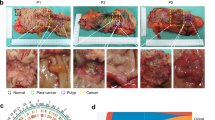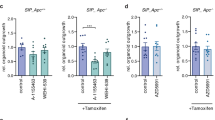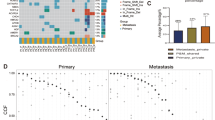Abstract
The met proto-oncogene is the tyrosine kinase growth factor receptor for hepatocyte growth factor. In the present study, we investigated the role of met expression on the modulation of apoptosis in colorectal tumours. The gene expressions of c-met and the anti-apoptotic bcl-2 family, including bcl-2, bcl-xLand bcl-w, were analysed in human colorectal adenomas and adenocarcinomas by using a quantitative polymerase chain-reaction combined with reverse transcription. In seven of 12 adenomas and seven of 11 carcinomas, the c-met gene was overexpressed. The bcl-w, bcl-2 and bcl-xLgenes were over-expressed in nine, five and six of 12 adenomas and in five, two and seven of 11 carcinomas, respectively. The c-met mRNA level in human colorectal adenomas and carcinomas was correlated with bcl-w but not with bcl-2 or with bcl-xLmRNA level. The administration of c-met-antisense oligonucleotides decreased Met protein levels in the LoVo human colon cancer cell line. In the case of c-met -antisense-treated cells, apoptotic cell death induced by serum deprivation was more prominent, compared to control or c-met-nonsense-treated cells. Treatment with c-met- antisense oligonucleotides inhibits the gene expression of bcl-w in LoVo cells. On the other hand, the gene expression of bcl-2 or bcl-xLwas not affected by treatment with c-met-antisense oligonucleotides. These findings suggest that Met expression modulates apoptosis through bcl-w expression in colorectal tumours. © 2000 Cancer Research Campaign
Similar content being viewed by others
Article PDF
Change history
16 November 2011
This paper was modified 12 months after initial publication to switch to Creative Commons licence terms, as noted at publication
References
Amicine L, Spagnoli FM, Späth G, Giordano S, Tommasini C, Bernardini S, De Luca V, Della Rocca C, Weiss MC, Comoglio PM & Tripodi M (1997) Transgenic expression in the liver of truncated Met blocks apoptosis and permits immortalization of hepatocytes. EMBO J 16: 495–503
Bhargava M, Knesel JJ, Halaban R, Li Y, Pang S, Goldberg I, Setter E, Donovan MA, Zaraegar R, Michalopoulos GA, Nakamura T, Falleto D & Rosen EM (1992) Scatter factor and hepatocyte growth factor: activities, properties and mechanisms. Cell Growth Differ 3: 11–20
Boise LH, González-Garcia M, Postema CE, Ding L, Lindsten T, Turka LA, Mao X, Nunez G & Thompson CB (1993) bcl-x, a bcl-2-related gene that functions as a dominant regulator of apoptotic cell death. Cell 74: 597–608
Bottaro DP, Rubin JS, Faletto DL, Chan AML, Kmiecik TE, Vande Woude GF & Aaronson SA (1991) The hepatocyte growth factor receptor is the c-met oncogene product. Science 251: 802–804
Chan AM, King HW, Deakin EA, Tempest PR, Hilkens J, Kroezen V, Edwards DR, Wills AJ, Brookes P & Cooper CS (1988) Characterization of the mouse met proto-oncogene. Oncogene 2: 593–599
Cleary ML, Smith SD & Sklar J (1986) Cloning and structural analysis of cDNAs for bcl-2 and a hybrid bcl-2/immunoglobulin transcript resulting from the t(14;18) translocation. Cell 47: 19–28
Di Renzo MF, Olivero M, Giacomini A, Porte H, Chastre E, Mirossay L, Nordlinger B, Bretti S, Bottardi S, Giordano S, Plebani M, Gespach C & Comoglio PM (1995) Overexpression and amplification of the Met/HGF receptor gene during the progression of colorectal cancer. Clin Cancer Res 1: 147–154
Fan S, Wang J-A, Yuan R-Q, Rockwell S, Janet A, Zlatapolskiy A, Goldberg ID & Rosen EM (1998) Scatter factor protects epithelial and carcinoma cells against apoptosis induced by DNA-damaging agents. Oncogene 17: 131–141
Frisch SM & Francis H (1994) Disruption of epithelial cell-matrix interactions induces apoptosis. J Cell Biol 124: 619–626
Gibson L, Holmgreen SP, Huang DCS, Bernard O, Copeland NG, Jenkins NA, Sutherland GR, Baker E, Adams JM & Cory S (1996) bcl-w, a novel member of the bcl-2 family, promotes cell survival. Oncogene 13: 665–675
Giordano S, Zhen Z, Medico E, Gaudino G, Galimi F & Comoglio PM (1993) Transfer of motogenic and invasive response to scatter factor/hepatocyte growth factor by transfection of human MET protooncogene. Proc Natl Acad Sci USA 90: 649–653
González-García M, Pérez-Ballestero R, Ding L, Duan L, Boise LH, Thompson CB & Núnez G (1994) bcl-xLis the major bcl-x mRNA from expressed during murine development and its product localizes to mitochondria. Development 120: 3033–3042
González IL Gorski JL Campen TJ, Dorney DJ, Erickson JM, Sylvester JE & Schmickel RD (1985) Variation among human 28S ribosomal RNA gene. Proc Natl Acad Sci USA 82: 7666–7670
Hadjiolov AA, Georgiev OI, Nosikov VV & Yavachev LP (1984) Primary and secondary structure of rat 28S ribosomal RNA. Nucleic Acid Res 25: 3677–3693
Kitamura S, Miyazaki Y, Shinomura Y, Kondo S, Kanayama S & Matsuzawa Y (1999) Peroxisome proliferator-activated receptor γ induces growth arrest and differentiation markers of human colon cancer cells. Jpn J Cancer Res 90: 75–80
Kondo S, Shinomura Y, Kanayama S, Higashimoto Y, Kiyohara T, Yasunaga Y, Kitamura S, Ueyama H, Imamura I, Fukui H & Matsuzawa Y (1995) Helicobacter pylori increases gene expression of hepatocyte growth factor in human gastric mucosa. Biochem Biophys Res Commun 210: 960–965
Kondo S, Shinomura Y, Kanayama S, Higashimoto Y, Miyagawa J-I, Minami T, Kiyohara T, Zushi S, Kitamura S, Isozaki K & Matsuzawa Y (1996) Overexpression of bcl-xLgene in human gastric adenomas and carcinomas. Int J Cancer 68: 727–730
Krajewska M, Moss SF, Krajewski S, Song K, Holt PR & Reed JC (1996) Elevated Expression of Bcl-x and reduced Bak in primary colorectal adenocarcinomas. Cancer Res 56: 2422–2427
Liu C, Park M & Tsao M-S (1992) Overexpression of c-met proto-oncogene but not epidermal growth factor receptor pr c-erbB-2 in primary human colorectal carcinomas. Oncogene 7: 181–185
Mondino A, Giordano S & Comoglio PM (1991) Defective posttranslational processing activates the tyrosine kinase encoded by the Met proto-oncogene (hepatocyte growth factor receptor). Mol Cell Biol 11: 6084–6092
Nagy P, Bisgaard HC, Santoni-Rugiu E & Thorgeirsson SS (1996) In vivo infusion of growth factors enhances the mitogenic response of rat hepatic ductal (oval) cells after administration of 2-acetylaminofluorene. Hepatology 23: 71–79
Naldini L, Vigna E, Narsimhan RP, Gandino G, Zarnegar R, Michalopoulos GK & Comoglio PM (1991) Hepatocyte growth factor (HGF) stimulates the tyrosine kinase activity of the receptor encoded by the proto-oncogene c-met. Oncogene 6: 501–504
Negrini M, Silini E, Kozak CA, Tsujimoto Y & Croce CM (1987) Molecular analysis of mbcl-2: structure and expression of the murine gene homologous to the human gene involved in follicular lymphoma. Cell 49: 455–463
Park M, Dean M, Kaul K, Braun MJ, Gonda MA & Vande Woude G (1987) Sequence of MET protooncogene cDNA has features characteristic of the tyrosine kinase family of growth-factor receptors. Proc Natl Acad Sci USA 84: 6379–6383
Rong S, Bodescot M, Blair D, Nakamura T, Mizuno K, Park M, Chan A, Aaronson S & Vande Woude GF (1992) Tumorigenicity of the met proto-oncogene and the gene for hepatocyte growth factor. Mol Cell Biol 12: 5152–5158
Rong S, Segal S, Anver M, Resau JH & Vande Woude GF (1994) Invasiveness and metastasis of NIH 3T3 cells induced by Met-hepatocyte growth factor/scatter factor autocrine stimulation. Proc Natl Acad Sci USA 99: 4731–4735
Rosen EM, Knesel J, Goldberg ID, Bhargava M, Joseph A, Zitnik R, Wines J, Kelley M & Rockwell S (1994) Scatter factor modulates the metastatic phenotype of the EMT6 mouse mammary tumor. Int J Cancer 57: 706–714
Umeki K, Shiota G & Kawasaki H (1999) Clinical significance of c-met oncogene alteration in human colorectal cancer. Oncology 56: 314–321
Author information
Authors and Affiliations
Rights and permissions
From twelve months after its original publication, this work is licensed under the Creative Commons Attribution-NonCommercial-Share Alike 3.0 Unported License. To view a copy of this license, visit http://creativecommons.org/licenses/by-nc-sa/3.0/
About this article
Cite this article
Kitamura, S., Kondo, S., Shinomura, Y. et al. Met/HGF receptor modulates bcl-w expression and inhibits apoptosis in human colorectal cancers. Br J Cancer 83, 668–673 (2000). https://doi.org/10.1054/bjoc.2000.1301
Received:
Revised:
Accepted:
Published:
Issue date:
DOI: https://doi.org/10.1054/bjoc.2000.1301
Keywords
This article is cited by
-
Long non-coding RNA XIST regulates ovarian cancer progression via modulating miR-335/BCL2L2 axis
World Journal of Surgical Oncology (2021)
-
BCL-w: apoptotic and non-apoptotic role in health and disease
Cell Death & Disease (2020)
-
Met, metastasis, motility and more
Nature Reviews Molecular Cell Biology (2003)



